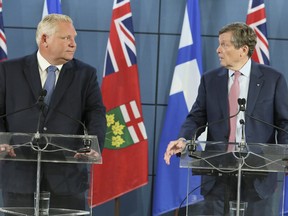Granting strong mayor powers doesn’t mean extending those powers to minority rule

Bill 39 is a fundamentally anti-democratic law that never should have seen the light of day. It’s taking strong mayor powers for cities such as Toronto and Ottawa and putting them on steroids.
It’s a law that Ontario’s Progressive Conservatives will come to regret in the future.
As the Canadian national soccer teams head to their respective FIFA World Cups, Derek Van Diest is on the scene to cover all the action. Expect expert insights and analysis in your inbox daily throughout the tournaments, and weekly on Thursdays for the rest of the season.
Thanks for signing up!
A welcome email is on its way. If you don't see it, please check your junk folder.
The next issue of Corner Kicks with Derek Van Diest will soon be in your inbox.
When Doug Ford proposed strong mayor powers in Ontario, I applauded. It was an idea long overdue in our system and, really, most voters already thought mayors had the abilities outlined in the bill.
Offering up general strong mayor powers such as the ability to set the budget priorities, appoint people to key roles and the like is fundamentally democratic. Mayors are elected citywide whereas councillors are elected to represent just their district.
In October’s election, Toronto Mayor John Tory was elected with 342,000 votes while several council members were elected with just 8,000 votes. In Ottawa, where Ford is also extending strong mayor powers, Mark Sutcliffe was elected mayor with 161,000 votes while one council member was elected with just over 2,500 votes.
Someone elected city wide should have more power than a local council member. This isn’t an American invention imported into Canada, there are variations of strong mayor powers in Montreal and Vancouver.
Granting strong mayor powers doesn’t mean extending those powers to minority rule, however.
RECOMMENDED VIDEO
That is part of what the Ford government is trying to do with Bill 39, which grants extra powers to mayors in select municipalities. Under this bill, John Tory could pass a bylaw in Toronto with anything more than one-third of the council voting for the bylaw if it is a bylaw in line with provincial priorities.
In real terms, that would mean passing a bylaw with just nine votes at a council meeting with 25 individual councillors and one mayor. There is nothing democratic about that process and I’m not sure how anyone can defend it.
Not that people haven’t tried.
Since Ford put forward this bill two weeks ago, I’ve heard from people who are not Ford backers who believe it is necessary. I’m not convinced in the slightest.
On Wednesday, Ford himself defended the bill against charges that he is trampling democracy.
“That’s not trampling on democracy,” Ford said. “Mayor Tory got more votes than all the councillors combined. And so having a councillor that scrapes in with 3,000 votes and has the same voting power as the mayor — that’s what’s trampling on democracy.”
That’s not an argument in favour of passing an anti-democratic piece of legislation, that’s an argument for bringing in fundamental changes to the municipal government structure.
The Ford government says that part of the reason for this bill is to help build homes faster, to push aside the NIMBYs who seem to have too much control over municipal affairs. While NIMBYs are a major issue, Toronto has approved more housing than has been built over the past several years, so in Toronto, this is not an issue.
Here is a principle that every politician, of every stripe, should live by. If you think that your side needs extraordinary powers to accomplish your goals, how would you feel about the other side having those same powers?
While the Ford government says this is about building housing faster and trying to drive down the price of homes – all laudable goals – what about when the government changes hands? The idea of an NDP premier working with an NDP mayor under such a law is terrifying.
I’m sure Premier Doug Ford would feel the same way, which makes me wonder why he’s making this move.
blilley@postmedia.com


